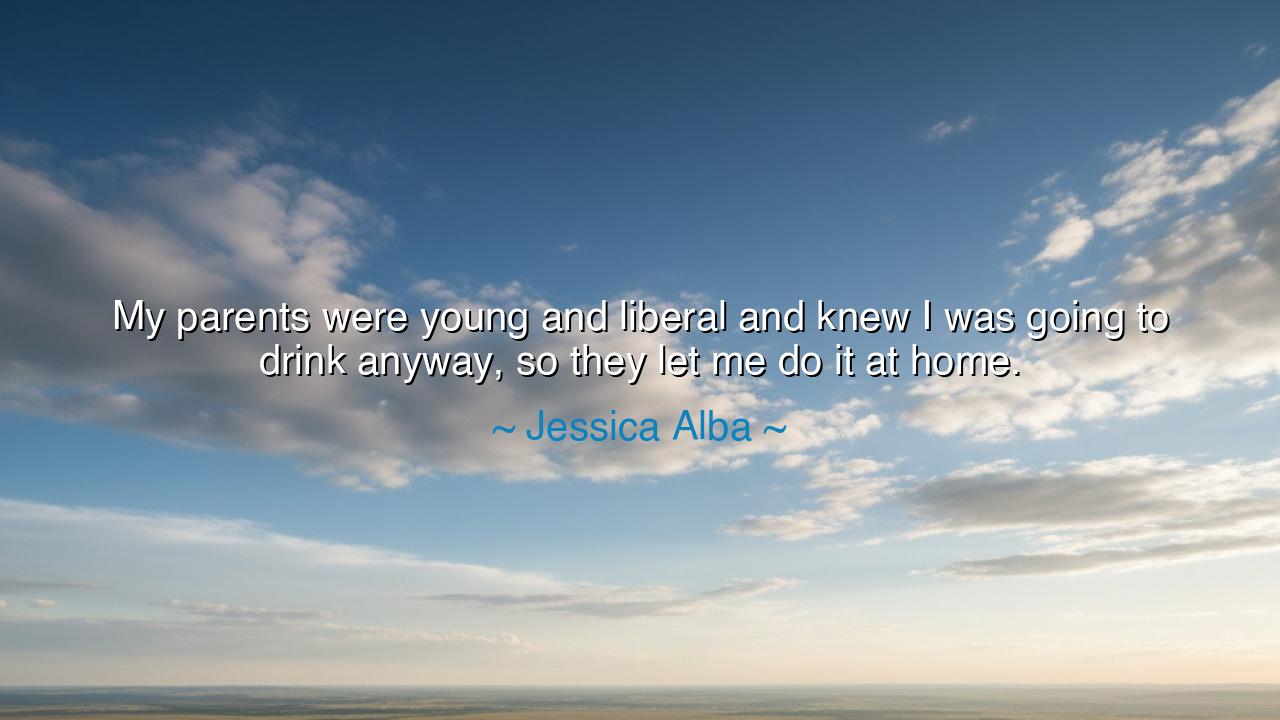
My parents were young and liberal and knew I was going to drink
My parents were young and liberal and knew I was going to drink anyway, so they let me do it at home.






In the quiet halls where elders once weighed the temper of youth against the vinegar of law, a saying like this would have been set upon the table as bread for thought: “My parents were young and liberal and knew I was going to drink anyway, so they let me do it at home.” Hear how the words carry both warmth and warning. They are not a trumpet for rebellion, but a lantern: a tale of stewardship, of guardians who choose nearness over denial, watchfulness over pretense. To be young is to remember the ache of curiosity; to be liberal—in the old sense—is to be generous with guidance, not reckless with duty. And to keep the fire at home is to say, “If you will approach the flame, do so where elders can tend it.”
Among the ancients there was a craft called supervision, more art than ordinance. The wise did not merely forbid; they taught measure. Wine—once mixed with water in the symposia—was treated not as a dare, but as a mirror for character. So too the parents in this saying: they do not celebrate the thirst; they shepherd it. Their choice acknowledges a hard truth: some rivers will run to the sea whether or not we build fences. Better, then, to guide the current, to seat the youth at a known table, to hold the cup to the light and speak of consequences before thirst becomes shipwreck.
Yet mark this: generosity without boundaries is not mercy but neglect. The hearth is safe only when the fire is governed. To drink at home—as this tale claims—must not be license without lesson, nor a wink at laws that shield the young. It must be a rite of candor, wherein trust is earned by truth-telling, where the measure of the cup is matched by the measure of responsibility. The ancient word for this is temperance: not the dry desert of refusal, but the fertile field of proportion—rain when needed, restraint when wise.
Take, for example, a story of our era. A girl—call her Miriam—was bright and restless, as spring rivers are. Her parents, remembering their own unruly tides, gathered her and said, “If curiosity knocks, it will knock on our door.” On a festival night, they set out bread, water, and a single small glass of wine. They spoke of family history: an uncle who sailed too close to the whirlpool and was lost; a grandmother who taught that celebration must not devour the celebrant. Miriam tasted, grimaced, and listened. Years later, when party winds blew fierce at the edge of town, she remembered the steady candle of that kitchen. She chose a ride home, called her mother without shame, and lived to laugh the next day. The lesson had not been the taste, but the tether.
History, too, offers its parables. Consider the city-states that taught their youth in courtyards under the eyes of mentors. What they supervised grew skillful; what they exiled into shadow grew strange and wild. Where a people made room for frank speech, folly found fewer places to hide. Where they pretended temptations did not exist, temptations learned to wear masks. Thus the saying before us claims a lineage: not defiance for defiance’s sake, but the old strategy—bring the storm under a roof, and teach the apprentice to read the clouds.
What then is the lesson we pass down? First, that love tells the truth about dangers and does not abandon the young to experiment in secrecy. Second, that home is a school for character—its table a lectern, its evenings a curriculum of trust, consequence, and care. Third, that laws and well-being matter; any household wisdom must honor the guardrails set for the sake of life. This is not an anthem for indulgence; it is a plea for courageous presence. Better the lantern of guidance than the blindness of denial—yet always with respect for the boundaries that keep the village whole.
Let your actions be simple and firm. Speak plainly with your children about risk, dignity, and choice. Model restraint in your own cup; example is the eldest teacher. Keep the doors of home open for honest return—no shame for calling early, no scorn for asking help. Teach alternatives to ceremony that do not hinge on drink: the poetry of music, the feast of conversation, the strength of saying “enough.” And remember: to be parents is to stand as keepers of the hearth. Keep the fire, yes—but keep it wisely, that warmth may remain warmth, and that no bright life be dimmed for want of watchful love.






AAdministratorAdministrator
Welcome, honored guests. Please leave a comment, we will respond soon